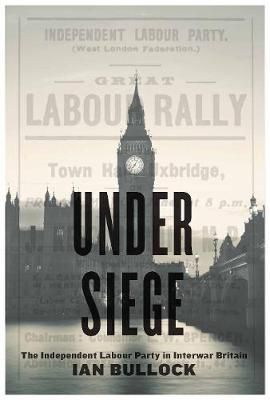Under Siege. The Independent Labour Party in Interwar Britain
Athabasca University Press, 2017
978-1- 77199-155- 1 paper
978-1- 77199-157- 5 epub
978-1- 77199-156- 8 pdf
Under Siege. The Independent Labour Party in Interwar Britain
During the two interwar decades the Independent Labour Party's radical and democratic socialism found itself 'under siege' both from those who wanted to merge the ILP with the Communist Party and from the notion that it should become simply an uncritical adjunct to Labour. There were other 'besiegers' including former Liberals and for a few years Sir Oswald Mosley in his pre-fascist incarnation.
I trace the debates and conflicts within the ILP between the end of the First World War and the outbreak of the Second - with some reference, particularly in Chapter 1, to the party's earlier history. I try to show how the votes of ILP MPs were crucial in installing Ramsay MacDonald as the first - formal - leader of the Labour Party and how he had made considerable efforts to attract and maintain ILP support in the 1918-22 years when he was out of parliament.
I explore the short period when Clifford Allen set the tone of the ILP and the achievements of lasting significance during these years. In the second half of the 1920s, with James Maxton now the dominant figure, the ILP became increasingly critical of MacDonald and the Labour Party and began to function as a 'party within the party' to a much greater extent and I follow the growing conflict between those MPs whose first loyalty was to the ILP and those who saw themselves as above all supporters of the Labour government of 1929-31.
The 1930s saw disaster for Labour and the disaffiliation of an ILP intent on pursuing a 'revolutionary policy' (in 1932) - a course which led to a steep decline in membership and a series of defections. I show how impossible it was, even with the 'reformist' pro-affiliationists now gone, to achieve any kind of agreement of what actually constituted such a policy and trace the ILP's growing alienation from not only the British CP but from the previously much-lauded Soviet Union though this was far from complete by 1939. The war in Spain, the ILP's identification with the POUM, and the Communist accusations of Trotskyism played a major part in this disillusion. I look at the ILP's not very convincing attempt to adopt 'democratic centralism' and the way this fell apart in the conflict over Ethiopia.
In a final chapter before the conclusion, I look briefly at what I call the 'ex-ILP' - those organised groupings which left the party claiming - to varying extents - to be the 'real' ILP and I conclude the book with my judgement that the ILP played a considerable role in preserving and developing a socialism that was both democratic and radical and single out three of its policies as still having significant relevance in the 21 st century - those on parliamentary reform, industrial democracy/guild socialism, and The Living Wage on 1926.
Under Siege. The Independent Labour Party in Interwar Britain Athabasca University Press, 2017
978-1- 77199-155- 1 paper
978-1- 77199-157- 5 epub
978-1- 77199-156- 8 pdf
